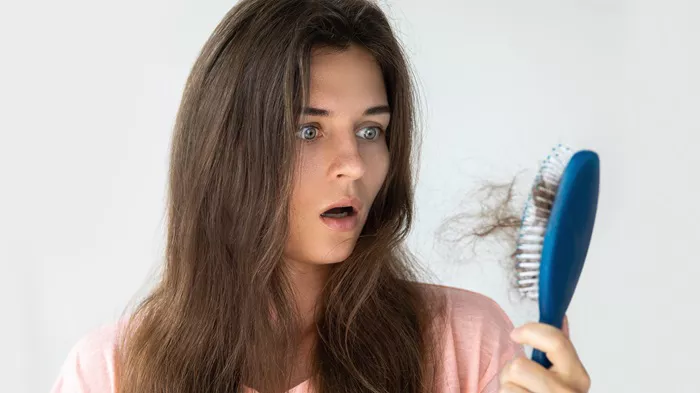Winter brings with it a myriad of seasonal changes, from chilly temperatures to festive holidays. However, for many individuals, it also signals a noticeable increase in hair fall. While it’s common to experience some degree of hair shedding throughout the year, the winter months often exacerbate this phenomenon. From dry scalps to reduced sunlight exposure, various factors contribute to winter hair loss. Understanding these causes is crucial for implementing effective preventive measures and maintaining healthy hair year-round.
Dry Scalp and Reduced Humidity:
Cold winter air tends to be dry, and indoor heating systems further contribute to reduced humidity levels. This combination creates an environment where moisture is scarce, leading to dryness and flakiness of the scalp. As the scalp becomes dehydrated, it weakens hair follicles, making them more prone to breakage and increased shedding. Proper hydration is essential not only for skin health but also for maintaining the strength and vitality of hair strands. Without adequate moisture, hair becomes brittle and more susceptible to damage.
Lack of Moisture:
The use of heaters and indulgence in hot showers during the winter months can strip the air of moisture, further exacerbating dry scalp conditions. Both the scalp and hair suffer from the lack of moisture, which can lead to increased hair breakage and excessive shedding. It’s essential to strike a balance between warmth and hydration, opting for lukewarm showers and utilizing humidifiers to add moisture back into the air. Additionally, incorporating hydrating hair care products can help replenish lost moisture and prevent further damage.
Poor Diet and Nutrition:
Nutrient deficiencies can have a significant impact on hair health, particularly during the winter when access to fresh fruits and vegetables may be limited. A diet lacking in essential vitamins, minerals, and proteins can weaken hair follicles and impede proper growth. To combat this, it’s crucial to prioritize a balanced diet rich in nutrients that support hair health. Foods such as leafy greens, lean proteins, and omega-3 fatty acids can promote strong, resilient hair strands. Additionally, dietary supplements may be beneficial for individuals struggling to meet their nutritional needs through diet alone.
Reduced Sun Exposure:
In winter, people tend to spend less time outdoors, resulting in reduced exposure to sunlight. Sunlight is a vital source of vitamin D, which plays a crucial role in maintaining healthy hair follicles. A deficiency in vitamin D can contribute to hair loss and slow hair growth. While it may be tempting to hibernate indoors during the colder months, making an effort to spend time outdoors, even in the winter sun, can help ensure adequate vitamin D levels. Alternatively, vitamin D supplements may be recommended for individuals with limited sun exposure.
Stress and Lifestyle Factors:
Stress, lack of sleep, and other lifestyle factors can significantly impact hair health and contribute to increased shedding. The demands of the holiday season, coupled with the challenges of navigating inclement weather, can take a toll on both physical and emotional well-being. Chronic stress disrupts the hair growth cycle, leading to premature shedding and thinning. It’s essential to prioritize self-care practices and stress management techniques, such as exercise, meditation, and adequate sleep, to support overall health and mitigate the effects of stress on hair.
Preventive Measures:
While winter hair loss may be inevitable for some, there are several preventive measures that individuals can take to minimize its impact:
1.Regular Trims: Schedule regular trims every 4-8 weeks to maintain hair health, remove split ends, and stimulate growth.
2.Hot Oil Massages: Incorporate hot oil massages using nourishing oils like coconut oil to strengthen the scalp and improve blood circulation.
3.Steam Treatments: Regular steaming opens hair follicles, allowing for better absorption of nutrients from hair care products.
4.Air Drying: Avoid excessive heat styling and opt for air drying whenever possible to prevent heat damage and breakage.
5.Protective Styling: Consider protective hairstyles such as braids or buns to minimize manipulation and reduce the risk of breakage.
6.Scalp Care: Prioritize scalp health by using gentle, sulfate-free shampoos and exfoliating regularly to remove dead skin cells and product buildup.
While these preventive measures can help mitigate winter hair loss, it’s essential to remember that individual experiences and hair types vary. Seeking personalized advice from a professional stylist or dermatologist can provide tailored recommendations based on specific needs and concerns.
In conclusion, winter hair loss is a common concern for many individuals, but understanding its underlying causes and implementing preventive measures can help maintain healthy hair year-round. By addressing factors such as dry scalp, lack of moisture, poor diet, reduced sun exposure, and lifestyle stressors, individuals can minimize the impact of winter on their hair health. Remember, consistency and patience are key when it comes to caring for your hair, so be proactive and prioritize self-care to ensure luscious locks, even in the coldest of months.
you may be interested

